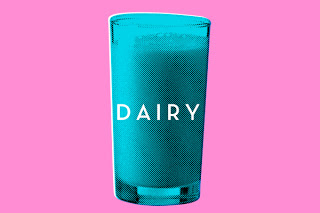 |
| From Refinery29 article, link below |
I was recently consulted for a Refinery29 article “No Whey: What Milk Really Does To Your Bod”. Dairy baffles many people that I thought I would review the dairy details.
Dairy Hierarchy
Not all dairy is the same. In any food category whether it’s carbs or soy sometimes you can tolerate or benefit from certain types versus others. You probably know I’m anti skim milk; non-skim, fermented, organic dairy is very different from conventional, skimmed, subpar stuff. It’s important to be discriminatory with your dairy.
Fermented dairy is easier to digest and fermented foods can benefit you well beyond your immune system. Unlike Vegas, what happens in your gut doesn’t stay in your gut and probiotic foods have far reaching effects from your weight to your mood.
Additionally, goat and sheep dairy is often better tolerated. Anti dairy folks often point out that it’s unnatural for us to drink another animal’s milk. In the case of goat and sheep’s milk it’s actually most similar to human breast milk in its makeup (I can’t decide if knowing this makes it more or less appealing). While lactose slightly lower in goat or sheep versus cow it’s really the casein content that makes the difference. Furthermore there are higher levels of MCTs (same type of fats in coconut milk) in goat and sheep versus cow milk. There’s a great sheep’s milk company called Old Chatham. Their ginger yogurt is amazing.
And unless you find antibiotics, added hormones and inferior nutrition appealing…if nothing else all dairy you purchase should be organic. You can make the argument that you can wash (not that this makes it pesticide free) an apple; you can’t wash your yogurt. A study on 3rd graders in another country showed their hormone levels soared after a month on US, conventional milk, enough said.
Pro Dairy
A case can be made that dairy helps with PMS symptoms (do you recall the California Milk Board’s ad geared toward men “living with PMS”? oy those caused a little bit of a backlash). Full fat dairy is associated with less fat around the waist or midsection, decreased likelihood of insulin resistance and type 2 diabetes. This is due to a fatty acid called palmitoleic. I expect we’ll be hearing more about this. And men who strength train may be able to get more muscular with dairy in their diets.
Dairy Drawbacks
If you look up the important research from Dr Davaasambu (what a name), you will see studies linking milk consumption to a host of cancers. The proposed reasoning is that cows are being milked more days per year, often when pregnant when levels of certain hormones are higher.
In terms of digestion, while many point to lactose as a source of tummy troubles, there’s another potential covert culprit and that’s casein. Casein is a protein in milk (I mentioned it earlier with sheep/goat dairy) that many people, especially those who have problems with gluten, do not do well with.
If a client presents with sinus symptoms and allergies or certain skin conditions, I consider advising them to experiment with ditching dairy.
Bones When it comes to bone health, if you’re only keyed in on calcium you’re missing the “bone” boat. We need calcium but it doesn’t have to come from dairy think about sardines, greens and beans. Having enough Vitamin D seems to be way more important than supplementing calcium. Additionally there’s magnesium sort of a sly player in the osteoporosis game.
Alternatives
There are a host of “alternative” milks from almond to cashew to coconut and nut milk is very easy to make (and delicious).If you choose to purchase nut milk make sure there’s no carrageenan in the ingredient list. In NYC, OMilk makes fantastic small-batch nut milks in fun flavors.
I think it’s important to think about your diet, your goals and consider whether you need dairy and how much; there’s certainly no need to overload on it. It’s no coincidence that as I googled dairy MyPlate and Dairy Counsels etc. came up. There’s this conventional “wisdom” or belief that we need lots of dairy to be a healthy and further that we should look for fat free and low fat sources. I would challenge both of those ideas. And our ability to digest dairy decreases with age so what worked at 20 may not at 50, reassess.
Do you eat dairy? How much and which types? Have you considered decreasing or desisting?


